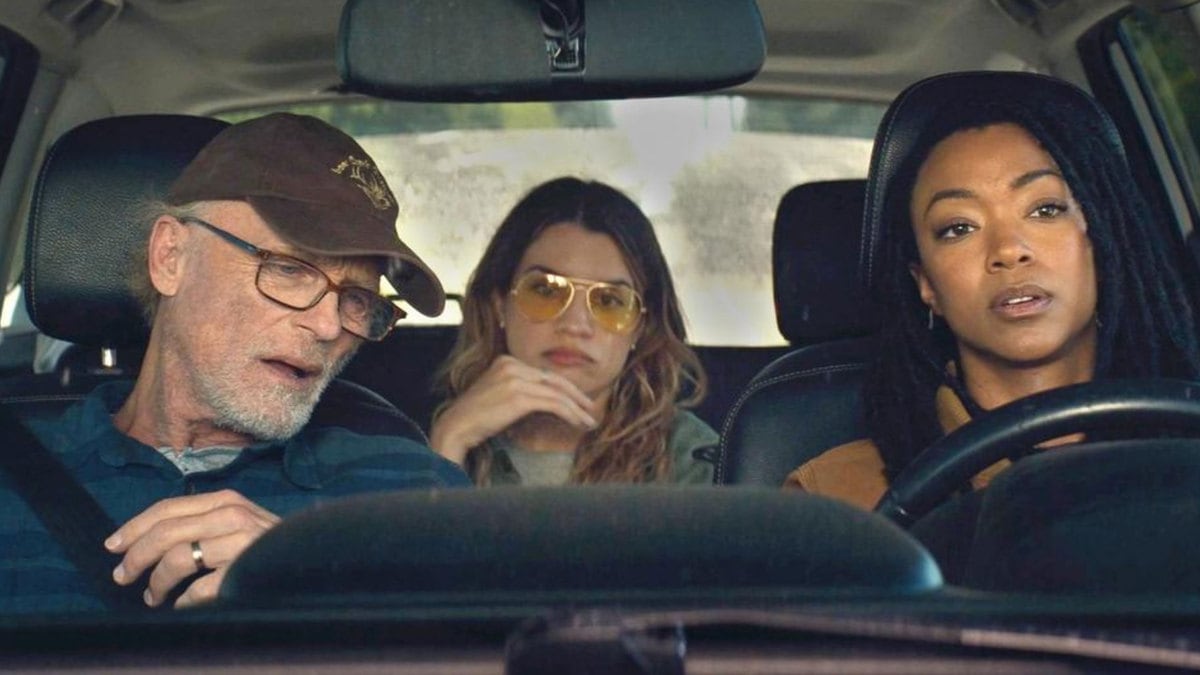There are few surprises in My Dead Friend Zoe, co-writer and director Kyle Hausmann Stokes’ (and executive producer/football mega-star Travis Kelce’s) feature debut. What would be another film’s big twist or tearjerker moment is, after all, right there in the title. But what stirred the audience at its March 9 premiere at SXSW Film Festival was how the story of a grief-stricken woman running away from her problems—at the behest of the titular spectral bestie that continues to haunt her—imbued its familiar formula with a sense of earnestness and charm. It’s a film that could easily veer into manipulative territory in lesser hands, but Hausmann Stokes transforms this personal and devastating story into something deeper, sweeter, and funnier than it may initially seem.
Adapted from a short film inspired by Hausmann Stokes’ own experiences as a veteran having lost friends to suicide, Zoe tells the story of Merit (Sonequa Martin-Green) and Zoe (Natalie Morales), fiercely close, Rihanna-loving, opposites-attract platoonmates—a friendship that we know from the start is doomed. The film shifts between flashbacks in Afghanistan, 2016, during Zoe and Merit’s service, and the present-day, where a stony-faced Merit seems to do little but run miles every day, attend therapy sessions, and stew in pained silence alone. Except that she’s never actually alone; memories of Zoe—and Zoe herself—continue to haunt her.
Merit sees Zoe everywhere she goes, a status quo that makes the film something of a ghost story. But Zoe is a funny, friendly ghost, offering biting commentary along the way: at group therapy sessions for fellow veterans suffering from post-traumatic stress symptoms, where Zoe’s mockery of other attendees’ stories discourages Merit from sharing her own; in Merit’s home, dissuading her from taking calls from her mom; and at the hospital to pick up her Alzheimer-stricken grandfather Dale (Ed Harris), bemusedly side-eyeing his lapses in memory.
Morales has spent years honing a knack for playing the likably snarky best friend; here, she adds an impressively dark texture to that trope, as it becomes obvious how badly Zoe is holding Merit back on her journey toward recovery. Merit is at first reluctant to face the pain that Zoe’s death causes her, closing herself off from friends and family to indulge her imagination. But as Merit starts to open herself up again—both to her grandfather as she moves back into the family lake house to help care for him and budding romantic interest Alex (the always welcome Utkarsh Ambudkar), who manages the retirement home that Merit’s mother hopes to move Dale into—Zoe begins to lash out.
These plot beats can be disappointingly predictable. It feels prescriptive, for instance, that the cute, random stranger Merit quickly turns out to be the guy in charge of the same place Merit’s resisting bringing her grandfather to. When Zoe later ruins Merit and Alex’s first date out of her deep-rooted fear of abandonment—that is to say, Merit’s desire to engage with the real world instead of just a manifested memory—it feels annoyingly rote. Even Morgan Freeman is reduced to a perfunctory role as Dr. Cole, who leads the group therapy sessions Merit neglects to attend, whose presence serves as a progress bar for Merit’s mental health. But it’s the strong performances and Hausmann Stokes’ clearly conveyed emotional investment in his storytelling that makes My Dead Friend Zoe consistently engaging nonetheless.
A large part of that is owed to its strong cast, with Ambudkar, Morales, and especially Martin-Green as clear standouts. In a just and decent world, Ambudkar would be the ascendant king of rom-coms; his chemistry with Martin-Green is instantly winning. Martin-Green does a great job of navigating scenes in which Merit juggles being present in actual conversations with listening to Zoe’s irrepressible sass alongside it. And Morales has never been better than here, especially in the later scenes, where Merit finally confronts Zoe about her anxiety over returning home after their tour in Afghanistan ends. The affection Zoe and Merit have for each other rings true, even as the film—intentionally or not—villainizes Zoe a bit toward the end, making the sequence in which we finally learn of the circumstances of Zoe’s death hard-hitting.
While My Dead Friend Zoe isn’t necessarily revelatory in what it’s trying to do, its honesty in doing them is refreshing. Hausmann Stokes dedicated the film to his own pair of “Zoes,” close friends from his army days who died by suicide after returning home. And other real-life veterans populate the film's group therapy scenes, which are laden with humor to prevent the film from entering treacly territory. In transforming his intensely personal story about grief and growth into something universally affecting, Hausmann Stokes pulls off something commendable.






